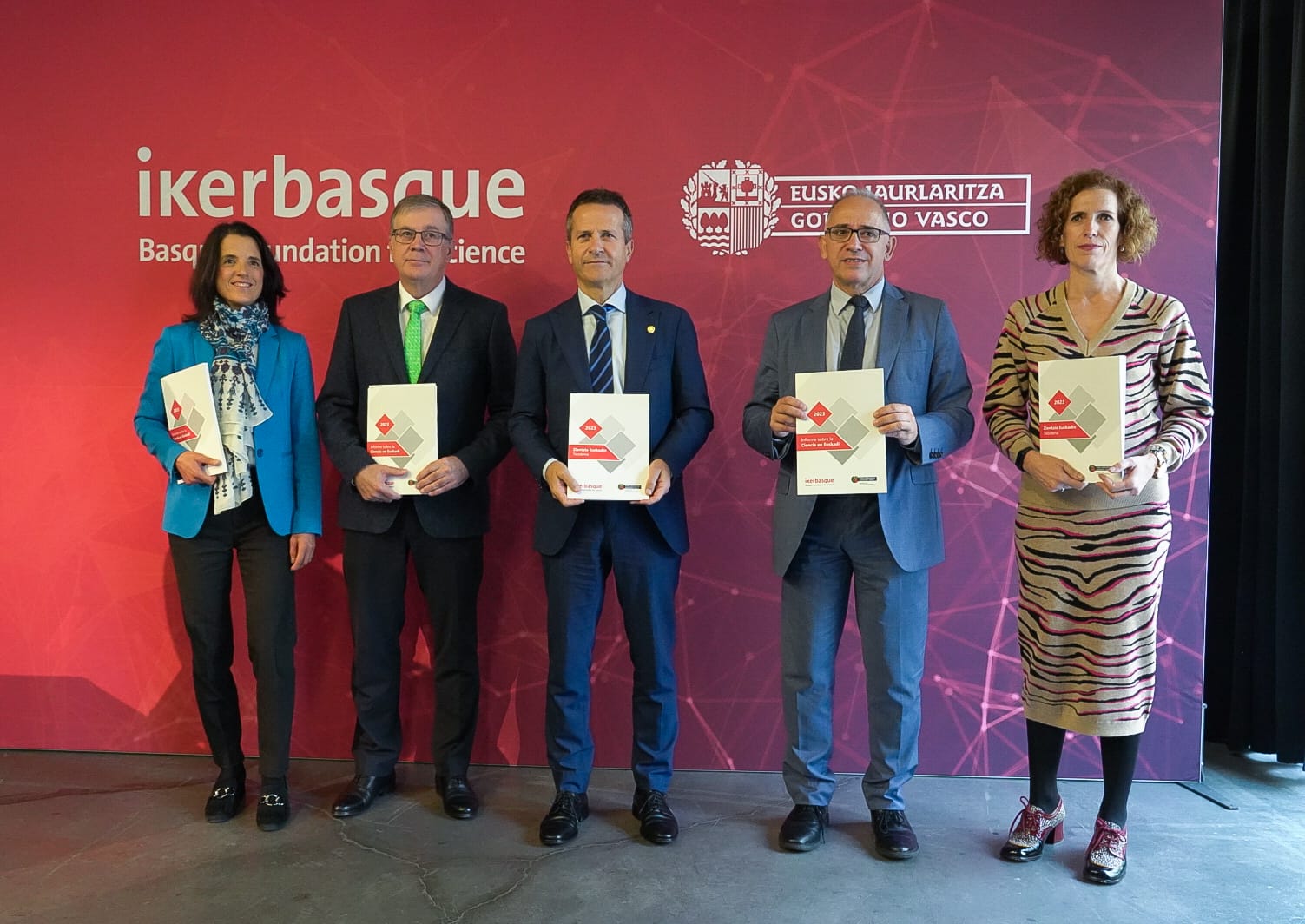
The Minister of Education Jokin Bildarratz, presented this morning together with the Vice Minister of Universities and Research, Adolfo Morais, and the Scientific Director of Ikerbasque, Fernando Cossío, the results of the 2023 Report on Science in Euskadi. The report includes the main results of the Basque Country regarding science funding, research staff, scientific results and technology transfer through the indicators monitored by Ikerboost, the Basque Observatory of Science and Technology.
In 2022, the Basque Country stabilized at around 8,000 scientific publications annually, specifically 7,818, with a production similar to the extraordinary previous year, and more than 14% compared to pre-pandemic production. Likewise, the quality of research production has increased considerably and is reflected in two aspects: The percentage of scientific production published in journals of the first quartile, the journals considered most prestigious, has doubled in the last decade in Euskadi. In 2022, 60% of scientific production has been produced in world-class journals. On the other hand, researchers from the Basque Country collaborate when publishing research results with the main science-producing countries worldwide: the United States, Germany, the United Kingdom, France and Italy. The internationalization of scientific production in the Basque Country has increased by almost 15 points during the last decade, going from 40% of publications with international collaboration in 2011 to 55% in 2022. In these international collaborations, the Researchers from the Basque Country have a relevant position, in many cases being the main authors of the publications.
According to the latest data published by the INE, Euskadi is the autonomous community of the State that invests the most in R&D activities with an investment of 2.3% of GDP. The latest R&D investment data in the Basque Country published by Eustat indicate an increase of 9.1% compared to the previous year, reaching the historical maximum of an investment of almost 1,800 million euros in 2022.
Likewise, Euskadi is the leading Autonomous Community in the per capita return of the European Horizon Europe program, with a fundraising of €240M between 2021 and 2022. The Horizon Europe Program has been established as a key tool for the research and innovation activities of the EU.
Within this program, the ERC grants from the European Research Council deserve special mention. These are projects that provide support to researchers of any nationality and age who wish to continue their research at the frontiers of knowledge. It has currently become an internationally recognized indicator of excellence, due to the high number of proposals and the demanding evaluation process that it follows. A total of 50 ERC projects have been developed in Euskadi. In 2023 in Euskadi there are 19 ERC projects underway, the historical maximum to date.
Regarding production by sectors, Basque universities participate in 65% of the total scientific production in Euskadi - boosted by the UPV/EHU, the main Basque scientific institution, with a contribution of around 4,500 indexed publications in 2022 -, followed by the health sector, BERC centers, technology centers and CICs. Over the last few years, new research centers have been promoted in Euskadi (BERCs, CICs and IISs) that have a growing weight in the Basque science system. Furthermore, collaboration between the university, BERC, CIC, health and technology sectors increases year after year.
During the last decade, the main thematic areas in which Euskadi researches have been maintained; The area where the most is published is Medicine followed by Engineering, Materials Sciences, Physics and Chemistry. Furthermore, in the last 10 years, productivity in Social Sciences and Humanities has experienced very notable growth.
Likewise, it is worth mentioning that around 5% of Euskadi's scientific production is cited in patents, once sufficient time has elapsed from the generation of new knowledge to its application.
Research community
In 2021, Euskadi exceeds 22,000 people dedicated to research work for the first time in its history. In full-time equivalent to EDP research there would be more than 14,000 people dedicated to research, which consolidates the upward trend in the number of researchers. These figures indicate that more than 2% of the active population of Euskadi is totally or partially dedicated to research work, that is, 2 people out of every 100 employees in Euskadi are totally or partially dedicated to research. This percentage positions Euskadi as the state's leading autonomous community in this indicator.
In 2021, nearly 500 people defended their doctoral thesis at the three Basque universities, thus consolidating the upward trend of recent years. From a gender analysis we observe that, although during the last decade the number of men and women who have defended their doctoral theses has been similar, being the number of new female doctors slightly higher than that of new doctors in Basque universities in seven of the last ten academic years, the growth of the research population in Euskadi has not contributed to significantly reducing the gender gap, in fact, in 2021 the percentage of women in EDP barely reach 35%.
Ikerboost, the Basque Science and Technology Observatory
The Ikerbasque Science and Technology Observatory includes a wide range of indicators based on proven sources of information, both at the Basque Country and at the national or international level, which allows a characterization of the Basque scientific community and its quantitative and qualitative comparison with those of others. countries. "Scientists share the results of their research by publishing them in specialized journals; the Ikerbasque Observatory monitors these publications by analyzing their quantity, international impact and thematic specialization," as explained Fernando Cossío, scientific director of Ikerbasque.
To download the report:
.png)
